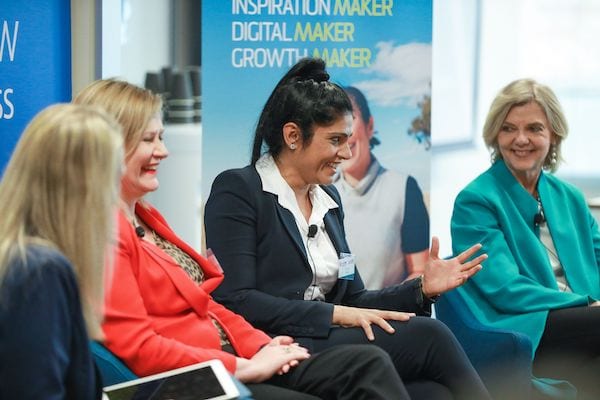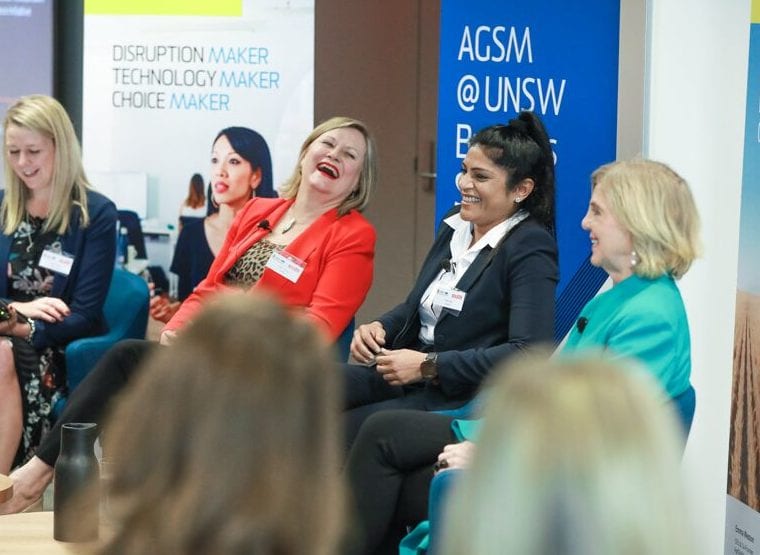Some such changes will be out of your control, others you may have intentionally put in motion.
And other big adjustments may occur during or following a career break, just as you’re attempting to make your career comeback.
We learnt how three women have successfully navigated such career transitions and breaks at a panel session Women’s Agenda recently hosted with AGSM @ UNSW Business School.
It came following our recent survey of 1800 women that found 55 per cent of those who’d taken a career break to have children feel more ambitious now than when before they had kids. Almost one third of all respondents (30 per cent) indicated they are looking to explore a new role over the next two years.
A huge proportion also indicated they are seeking promotions, pay rises and better flexible working options — suggesting that some kind of career transition may be needed in order to make it happen.
The panel featured three wildly successful women who have pursued very different leadership careers and made big leaps into the unknown along the way (and often when they were at their most vulnerable). The panelists included former NSW Liberal party leader Kerry Chikarovski, Clipsal Solar CEO Preeti Bajaj and AGSM MBAE 2000 alumnus and business leader Jacki Johnson.
Below are a few key takeaways, in addition to what we shared last week from the panel on courage and confidence.
It takes serious courage. Courage was the overriding theme of the event, with all three panellists sharing how the courage to say ‘yes’, to put your hand up for an opportunity, and to be the first woman in a role, had given their leadership careers momentum. They could pinpoint specific moments of courage during their individual journeys, times when they put themselves forward when they knew they would need to figure out the details once the role or opportunity was secured.
Kerry was in her mid thirties and had taken an extended step back from her legal career when she decided to put her hand up to run for state government. As she told our audience: “Luck is part of it. Timing is part of it. But the most important part is being courageous, just being prepared to put up your hand and have a go.”
“What’s the worst that can happen? You lose, you don’t get it and you go and find something else to do.”
Go beyond a mentor to find someone who has your back. Having great mentors is a given in any successful career, but even more important is ensuring that someone’s got your back, whether that be a colleague, friend or family member. You need to have somebody in your corner who will listen and be available for you if and when you need to say, “I’m not ok”.
“It’s OK to not be confident,” said Preeti. “And it’s even better to have people around you that you can say to, ‘I’m not feeling confident’.
“Having people who support you and help you test the possibilities is so important,” added Jacki.
Don’t wait. Be the first. All three panelists shared times when they had been the first woman in a role or situation. Preeti became the first woman to open a night club in New Delhi, Kerry the first to lead the Liberal Party in NSW and Jacki the first to lead a NSW state advisory board. They never sought permission to take on these roles and defied social stigmas and stereotypes in the process. If they had waited for other women to pave the way ahead of them, their careers would not have turned out the way they did.
Be willing to reject social expectations. All three panellists shared stories about when they had defied the expectations of others regarding what they could and could not do. In Jacki’s case, it involved seeing her husband take on the role of primary carer and the bulk of the parental leave following the birth of their daughter — in the early nineties, at a time when such a move that was highly unusual.
Get active, in order to get started. Feeling stuck? Start by doing something, anything — even if it’s as simple as updating your CV or LinkedIn account. As Preeti explained, making such movements is a way to get yourself learning and your mind adapting and moving into the thought of possibilities. She said it’s a great strategy for pushing through fear, and something that’s enabled her to make big career transitions.
You don’t need to be the smartest person in the room. But you do need to have the willingness to learn. Surround yourself with smart people, allow yourself to ask questions and learn. “This is an amazing nation of learning and knowledge, as long as you are willing to ask,” said Preeti. “I knew nothing,” she said on starting business in Australia. “But I knew that it was OK to ask questions, that it was Ok to learn. I found that people are willing to share so much, as long as you ask.”
Use purpose to drive your direction. Once you know your purpose (and if you don’t, figure it out), you can map out the direction you want to go, and then use your overarching goals to help alleviate some of the fears you might be having while taking a leap into the unknown. Purpose will help lift your confidence, advised Jacki. It will enable you to have the courageous conversations you need in order to successfully make a career transition.
Know your strengths, and when to ignore others. Get comfortable with the strengths you have and know how to use them to your advantage. Have the confidence to know these strengths will get you through the challenging times.
And when it comes to the opinions of others? Know when to pick and choose advice — and how to block out the naysayers. “At times, if I had listened to others, I would have been too terrified to move forward,” Jacki said. “But I knew that I could learn things. Well meaning colleagues in your sector will often tell you that you are doing the wrong thing. You need know when to ignore them.”





